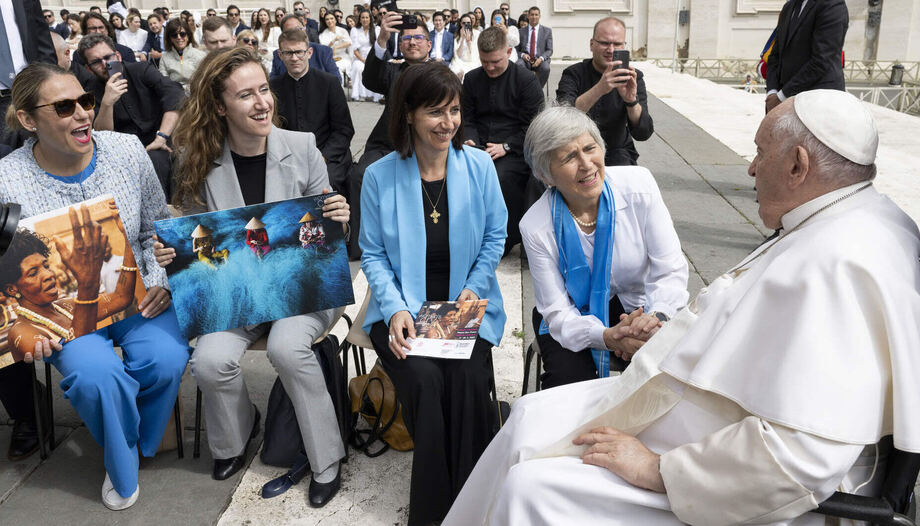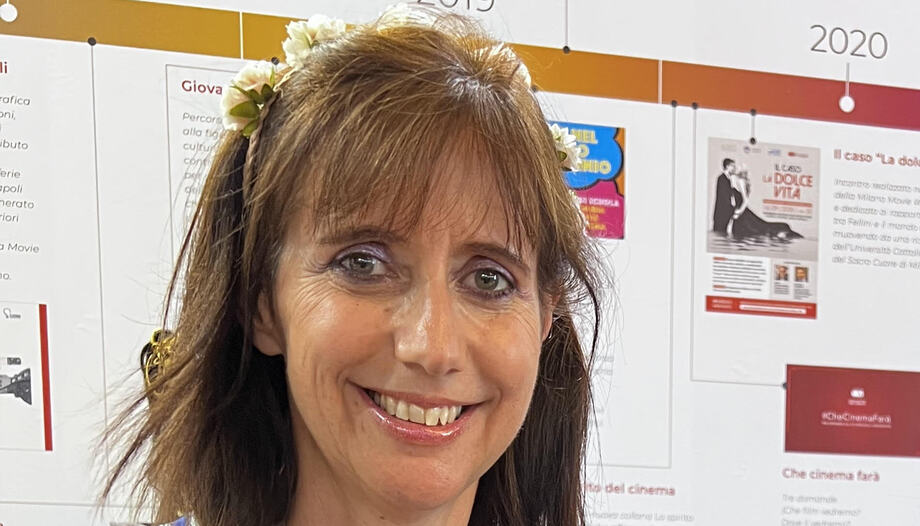Lia Beltrami is winner of the Venice Golden Lion for Peace 2017, director, writer, human rights activist and founder of "Women of Faith for Peace," a three-day event in Trento to challenge the wartime situations experienced by Europa and the world.
Beltrami organizes these days together with the Shemà Association, Emotions to generate change, Lead Integrity, International Center for Peace among Peoples of Assisi, with the support of the Fondazione Caritro.
In this interview with Omnes, the founder assures us that: "The path of dialogue can be much more effective among people of faith. However, when religion is used for political purposes, it becomes a terrible weapon.
How was "Women of Faith for Peace" born?
- In 1997 we founded with my husband the film festival "Religion Today", which was something like the first festival that talked about interreligious dialogue. It started in Trento, then in Bologna, then in Rome, and we had venues a bit everywhere, it was a pilgrimage festival. In particular, we also made a fixed stop in Jerusalem, where we screened films on dialogue and had in-depth meetings.
After about ten years I realized that through cinema we were not able to sufficiently promote those values of peace. Although we had built bridges, contacts, built very good relationships, we needed something more incisive and so, together with a film distributor from Jerusalem, "Hedva Goldschmidt", I came up with the idea to start this women's groups leaders of five different religious communities in the Holy Land.
When was the first group born?
- The first group of eight women - Orthodox, ultra-Orthodox, Catholic, Christian, Druze and Bedouin Jews - arrived in Trento in 2010 for the first cohabitation workshop. During those intense days, these women leaders went from being enemies to becoming sisters.
Why does it say "enemies"?
- Enemies because, for example, the Palestinian woman Faten Zenati, who first stood next to an Orthodox Jewess, said publicly: 'The first day she was my enemy, because she was an Orthodox Jewess and a settler. Then, day after day, she became a friend, and then a sister. On the last night she asked me to share the same room so that she could also enjoy the precious minutes before bedtime'.
And how does this translate into practice?
- We are talking about very concrete projects. For example, in the city of Lod, a city of high tension, Faten Zenati founded with other Jews the first mixed social center, for all. Faten died two years ago, still too young, and on the day of his death, the president of Israel, Herzog, came to the house, which was full of Palestinians. An important step at the time. Today everything has changed.
How many are in this movement today?
- Then the movement spreads a little bit all over the world, a free movement of inspiration, there is no number of people who are part of it, but we try to be present in conflict zones, trying to inspire women from opposite factions to walk a path together. We have started paths in Kosovo, in sub-Saharan Africa, in Colombia, in Myanmar.
But in the case of Colombia, was it related to the guerrilla conflict?
- In Colombia we supported Natalia Herrera to organize a film festival of women from the mountains. There were women from different regions, but also from internal conflicts, not only political but also between different factions, to unite people who want to live in peace.
I see in the name of your association that you are not only women, but women of faith....
- Women of faith because being a woman means participating in creation; they are women who generate life from all points of view, who teach their children words of life. And of faith because we live it through our belonging to different religious communities. And this is important because the path of dialogue finds fertile ground in people of faith. We feel united precisely because of our faith in God, because dialogue and peace are promoted in all religions. The path of dialogue can be very effective among people of faith.
On the other hand, Marxism and others say that religions are the engines of wars...
- When religion is instrumentalized for political ends, it becomes a terrible weapon. On the contrary, if faith is lived deeply within religion itself, in its truth, it can only lead to fraternity.
Now I ask you an impish question: today we have the war in Ukraine and Russia, and then there are no words to talk about the situation between Palestine and Israel. One would say that it is discouraging, to see that what is sown does not bear fruit....
- After covid, we all met two years ago at Faten Zenati's funeral, in a summer full of attempts at dialogue in the Middle East. We suddenly felt destroyed by these two wars, along with all the others. We thought about stopping in the face of the horror, but then decided to start again with a new encounter. We realized that, at the moment of greatest discouragement, we had to have the revolutionary courage to talk about peace, not just to talk about it, but to live peace. Pope Francis has been one of the few voices to condemn war in all its forms.
So we think that this is precisely the moment to strongly relaunch the path of peace, to reinvigorate the hearts of women who are on the front line, even though we know it is very difficult.
She makes it clear, it is a very difficult time.
- I give a concrete example: one of the Palestinian Sufi women in Gaza lost 21 close family members when the hospital was bombed. On the other hand, our Orthodox Jewish film distributor lost one of her directors and two grandchildren on the first day. Where do we start with these women who have always been very courageous? How do we weave networks of peace?
In these months of hard work, the word that resonated the most was fear. They live in terror, in fear. So the only thing we can do is to make these women feel that they are not alone, that we are united and that we are together.
How do we get out of this situation?
- On the one hand, diplomacy must start again with real intentions, as Pope Francis asks, with the path of serious dialogue and disarmament. But this part is not enough. If we look a little bit at the world of communication or listening to people talk ..... Until four or five years ago, it was difficult to talk about conflict and the word peace was stronger, we talked about dialogue... Today, listening to the media, or listening to speeches, it is almost taken for granted that it has to be war, that is, we have returned to the first half of the last century, when war was still proposed as the only solution.
In the case of Palestine and others it is very clear. But in the case of Ukraine, would there be any nuance?
- There is no room for nuance when it comes to peace. We must demand peace, a pact that is respected by the parties. And we must not close the door to those who come from the other side. I think it is necessary to stand by all the people 'of peace', wherever they are, to do all they can from within and from without. Each one of us can do something, however small it may be.
Where do we start?
- We must have the courage to dismantle this, otherwise diplomacy will not be able to get going again. And, on the other hand, I firmly believe that we have to break down these walls in civil society. I mean, civil society must be united. You can't say, 'you don't participate in a competition because you come from a people who attacked another country.' No, the people of civil society must be strong, so that the voice of dialogue is heard, so that the voice of peace is heard. So the more we can work together with people from all factions, the more possibilities we have to generate movements that oppose war.
And together with this we must work on ourselves, with great commitment, to overcome the violence that lurks in prejudices, in thoughts, in closed-mindedness. Peace begins in our hearts, but then it must be promoted everywhere and always.
Peace is a garden to be cultivated and cared for every day.
I know you also work with young people.
- This year, 25 young people between the ages of 16 and 26 are participating in the event and training on the theme of dialogue and peace, and these young people will work together with "Women of Faith for Peace" to stimulate and give rise to new waves of young voices. It is a natural thing, because there are many motivated youth who go beyond the populist waves and are really looking for different paths. We must walk with these young people, give them space and listen to their opinions and ideas. That is why the Pine days will be very important.
On the Piné plateau, in Trentino, this new experience was born at Casa Iride, promoted by the Shemà Association. The inauguration, in July, was attended by Andrea Tornielli, who gave a lecture, followed by meetings with the choreographer of the Marcos Moura favela, Rodrigo Baima, a lecture by Bishop Luigi Bressan and a concert by the guitarist Carlos Biondini. Throughout the summer, there were camps for the youngest and the oldest, in which emotions and dialogue were discussed: 2,000 people attended. The group of young people are all volunteers and trainers of this experience, which they will then pass on to people in other places.

More information about the event in Trento
Forty people from different generations will participate, with a special focus on and with young people. International guests will include: Azza Karam, founder of Lead Integrity, board member of the Temple of Understanding and of the Parliament of the World's Religions, of the Royal Institute for Interfaith Studies of Amman (Jordan), of the United Nations Secretary General's Advisory Committee for Multilateralism. Caterina Costa President of the International Center for Peace among Peoples of Assisi. Cristiane Murray Brazilian journalist, Deputy Director of the Holy See Press Office.
In addition, the event will be attended by: Daria Schlifstein, Jewish artist and filmmaker. Deana Walker Herrera, Cuban-American manager of social impact projects. Kamal Layachi, imam in the Islamic Communities of Veneto. Lara Mattivi, psychologist, co-founder of the Shema' Association. Lia Beltrami, director, lecturer, founder of Women of Faith for Peace and the Religion Today Film Festival. Monsignor Luigi Bressan, in the diplomatic service of the Holy See in various nations and international institutions (UN and Europe) until 1999. Then for 17 years Archbishop of Trento and since 2016 responsible for the CEI for pilgrimages and international volunteering. Author of books on interreligious dialogue, history, international relations.
Also speaking will be: Maria Lia Zervino, Argentinean consecrated woman, consultant to the Dicastery for Interreligious Dialogue Marianna Beltrami, writer, filmmaker and musician of Emotions to Generate Change, graduate of Warwick and Oxford in International Relations and Environmental Philosophy Marina Khabarova, international film producer, dedicated to dialogue and the promotion of the values of peace Natalia Soboleva, business executive in Switzerland, committed to sustainability, President of Monaco Charity. Nancy Falcon is committed to interreligious dialogue, peace building and youth education. She holds a degree in Political Science with a specialization in philosophy and Islamic studies. Nuha Farran, international lawyer and human rights defender from Jerusalem, co-founder of "Women of Faith for Peace".
The event is organized by Women of Faith for Peace, Associazione Shema, Emotions to Generate Change, Lead Integrity and the Assisi International Center for Peace among Peoples, with the support of Fondazione Caritro.








